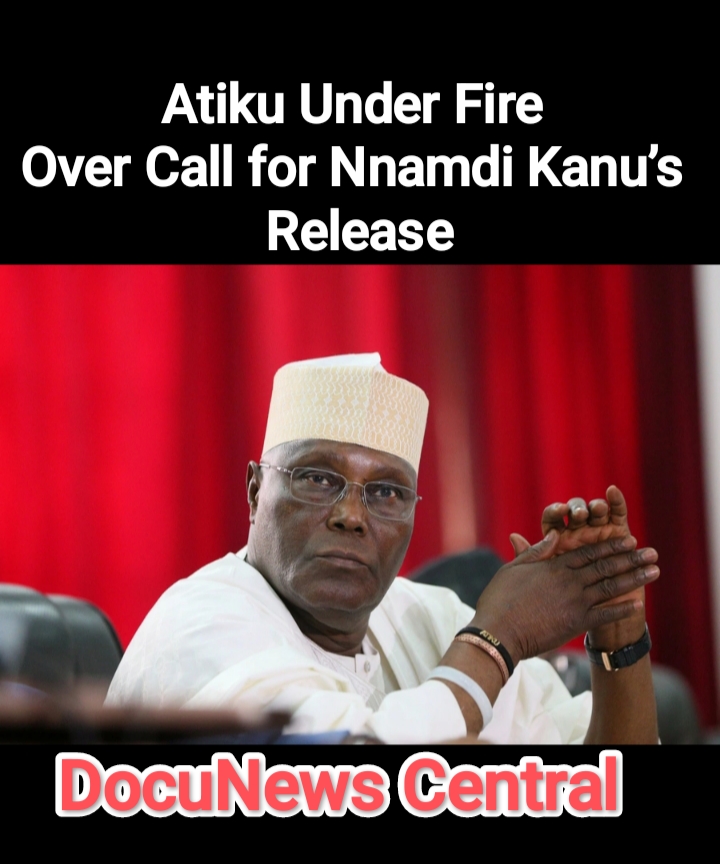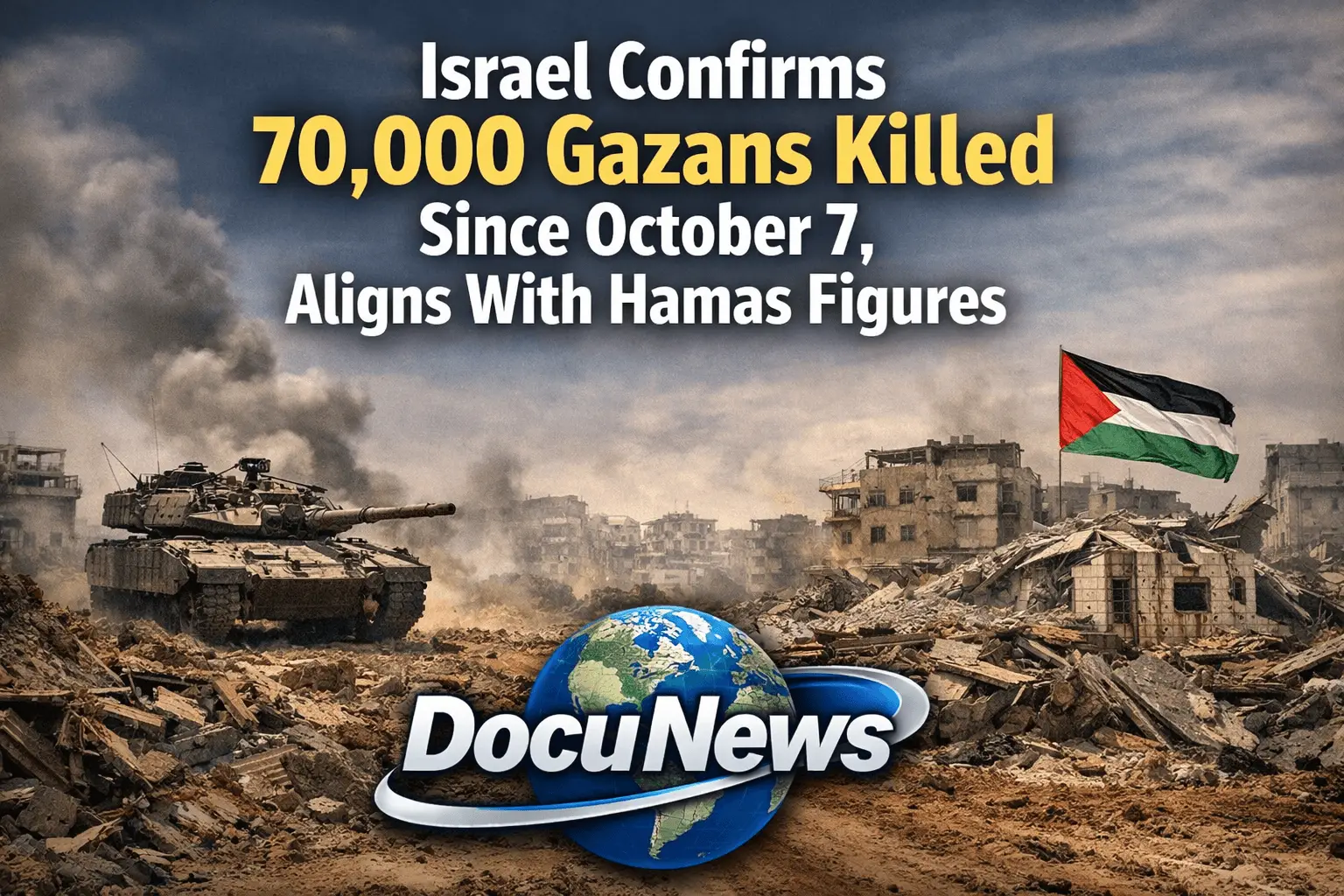
By DocuNews Central – October 2025
The former Vice President of Nigeria, Atiku Abubakar, has come under intense criticism following his recent call for the unconditional release of Nnamdi Kanu, the detained leader of the Indigenous People of Biafra (IPOB). His statement has triggered a nationwide debate touching on justice, politics, and the rule of law.

Background: Atiku’s Position and Calls for Release
Atiku recently joined activist Omoyele Sowore in advocating for Nnamdi Kanu’s freedom, describing the continued detention of the IPOB leader despite court orders as “an open sore on our nation’s conscience.” According to Atiku, ignoring valid court rulings undermines Nigeria’s democratic foundation and portrays government institutions as selective in justice.
He argued that defying court orders granting bail amounts to abuse of executive power, warning that the situation could deepen national wounds and erode public trust in the judiciary.
Democracy Watch Initiative (DWI) Reacts Strongly
The Democracy Watch Initiative (DWI) swiftly condemned Atiku’s comments, accusing him of undermining the rule of law and politicizing a sensitive legal matter. The group described Atiku’s stance as “reckless and inconsistent,” asserting that Kanu faces grave charges that should be resolved through due process rather than political pressure.
1. Undermining the Rule of Law
DWI insists that Kanu’s case involves charges such as terrorism, treasonable felony, and incitement to violence. According to the group, any attempt to secure his unconditional release without a judicial process threatens to weaken Nigeria’s legal system and embolden lawlessness.
2. Political Hypocrisy
The group also accused Atiku of political inconsistency. They argued that while he criticized President Tinubu’s pardons for certain offenders, he now demands full freedom for someone facing national security charges. This, they say, represents selective morality.
3. Ignoring Victims’ Pain
DWI drew attention to the victims of violence allegedly linked to IPOB activities, stating that unconditional release without justice for the deceased and affected families would be a betrayal of national memory.
4. Questionable Political Motives
The organization warned that Atiku’s move could be politically motivated. They noted that his timing—so close to upcoming political realignments—suggests an attempt to gain sympathy among certain groups ahead of the 2027 elections.
5. Eroding Public Trust in Institutions
When national figures appear to dismiss ongoing court cases, DWI noted, it creates a perception that political power can override legal authority—an idea that could damage citizens’ faith in democratic institutions.
Other Voices in the Debate
Several other groups have echoed DWI’s position:
- Njiko Amaka, a coalition of U.S.-based Igbo professionals, accused Atiku and Sowore of using the “Free Nnamdi Kanu Now” campaign as a political tool to disrupt the court process.
- The group questioned why Atiku has not championed similar causes for other long-detained individuals, calling his advocacy “regionally selective.”
- A Northern Coalition also berated Atiku for neglecting the potential security implications of freeing Kanu without due process.
Issues and Tensions at Play
1. Justice vs. Politics
Atiku’s intervention has reignited a national conversation about whether his motives are rooted in principle or political calculation. While some hail his courage, others believe it is a veiled strategy to court sympathy in the South-East.
2. Separation of Powers
Critics argue that demanding release in a case still before the court amounts to political interference, which could undermine judicial independence and the doctrine of separation of powers.
3. Ethnic and Regional Sensitivities
Kanu’s case is deeply emotional in the South-East region. Atiku’s support—given his northern background—adds another layer of complexity to an already volatile discussion on national unity.
4. Selective Advocacy
Some observers have noted that if the former vice president is truly committed to justice, his advocacy should extend to all political detainees across Nigeria, not just high-profile figures.
5. Public Perception and Stability
Social media debates and community reactions reveal a divided public mood. While human rights groups celebrate Atiku’s stance, others see it as a dangerous populist move that could reignite regional tensions.
Legal Updates: What Happens Next?
Nnamdi Kanu’s trial continues in the Federal High Court, with recent rulings confirming that his medical condition is not life-threatening. The court has granted his defense team six days, starting October 23, to present their case in full.
Meanwhile, the planned “Free Nnamdi Kanu Now” protest scheduled for October 20 has drawn heavy security attention, as authorities work to prevent possible disruptions. Analysts believe how this protest unfolds could influence both legal and political outcomes.
Conclusion
Atiku Abubakar’s call for Nnamdi Kanu’s release has undoubtedly opened another chapter in Nigeria’s evolving democratic story. Supporters view it as a principled stand for human rights and the rule of law, while critics interpret it as opportunism driven by political ambition.
Whatever the case, this debate highlights a recurring Nigerian dilemma — the balance between justice, politics, and national unity. As events unfold, Nigerians will be watching to see whether rule of law or political expediency ultimately prevails.
For more verified political news, analysis, and fact-checks, visit DocuNewsCentral.com.











Your point of view caught my eye and was very interesting. Thanks. I have a question for you.